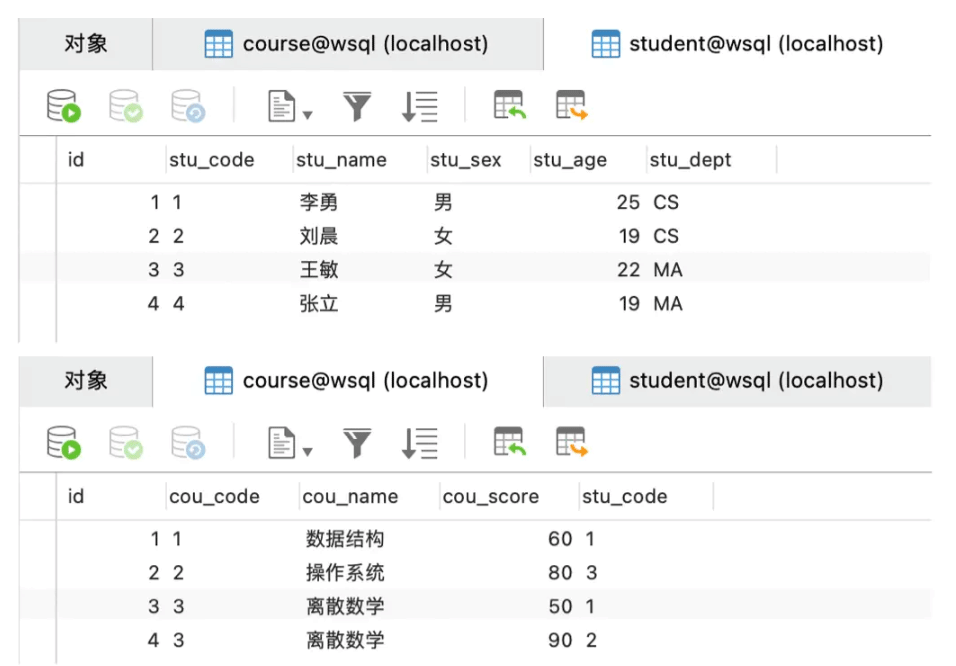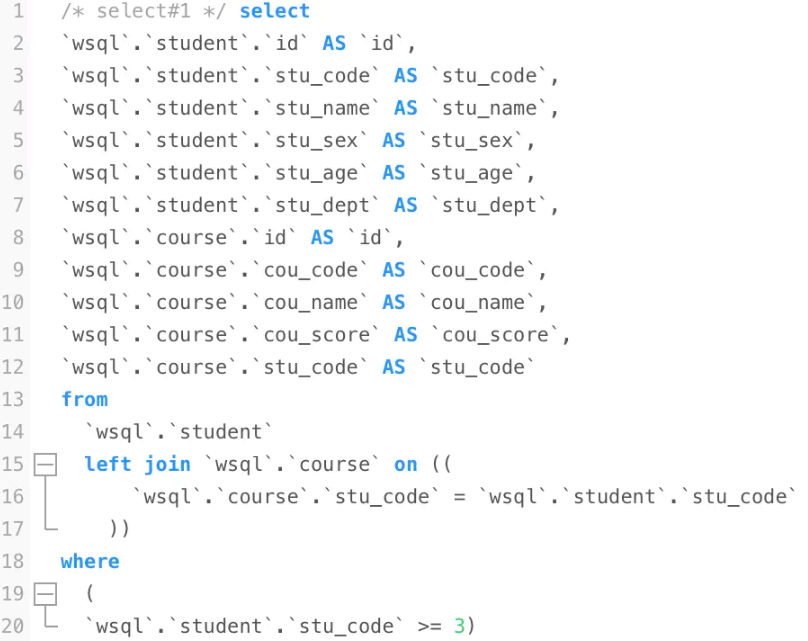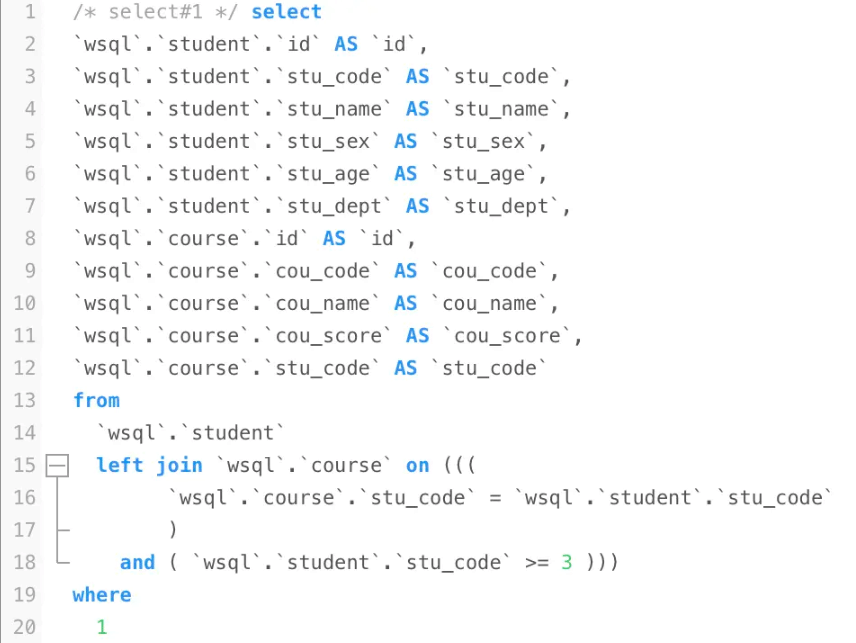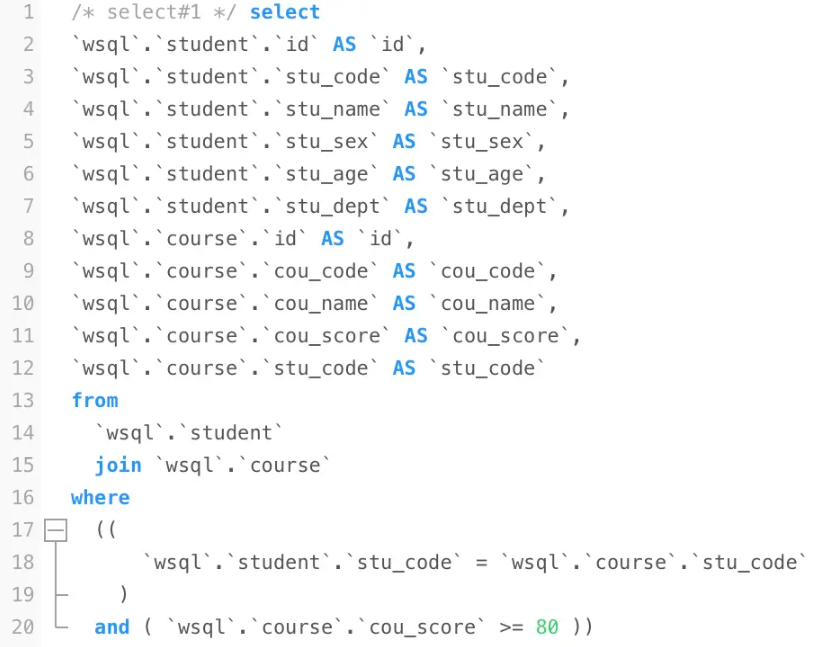What is the execution process of Mysql table connection?
1. Foreword
For connection operations, we put the association conditions between the driving table and the driven table after on. If additional conditions for the driving table and the driven table are added, If the filter conditions of the driven table are placed after on or where, no error will be reported, but the result set obtained is different? ? ?
1.1 The principle of mysql connection
As we all know, mysql is based on the Nested-Loop Join (Nested-Loop Join, not considering the optimization algorithm for the time being) algorithm to perform connection operations between tables The general process is as follows:
Select the driver table and use the filter conditions related to the driver table to execute a single-table query on the driver table;
For each record in the queried driver table, search for matching records in the driven table.
The pseudo code is as follows:
for each row in t1 { // 遍历满足对t1单表查询结果集中的每一条纪录
for each row in t2 { // 对于某条t1纪录,遍历满足对t2单表查询结果集中的每一条纪录
if row satisfies join conditions, send to client
}
}1.2 show warnings command
The sql statement we wrote is optimized by the optimizer It will then be handed over to the executor for execution, and the show warnings command can help us obtain the SQL optimized by the optimizer.
2. Preparation
The table structure is as follows:
CREATE TABLE `student` ( `id` bigint(20) NOT NULL AUTO_INCREMENT, `stu_code` varchar(20) NOT NULL DEFAULT '', `stu_name` varchar(30) NOT NULL DEFAULT '', `stu_sex` varchar(10) NOT NULL DEFAULT '', `stu_age` int(10) NOT NULL DEFAULT '0', `stu_dept` varchar(30) NOT NULL DEFAULT '', PRIMARY KEY (`id`) USING BTREE, UNIQUE KEY `uq_stu_code` (`stu_code`) ) ENGINE=InnoDB AUTO_INCREMENT=43 DEFAULT CHARSET=utf8mb4 CREATE TABLE `course` ( `id` bigint(20) NOT NULL AUTO_INCREMENT, `cou_code` varchar(20) NOT NULL DEFAULT '', `cou_name` varchar(50) NOT NULL DEFAULT '', `cou_score` int(10) NOT NULL DEFAULT '0', `stu_code` varchar(20) NOT NULL DEFAULT '', PRIMARY KEY (`id`) USING BTREE, KEY `idx_stu_code_cou_code` (`stu_code`,`cou_code`) ) ENGINE=InnoDB AUTO_INCREMENT=19 DEFAULT CHARSET=utf8mb4
The table data is as follows:

3. The difference between inner join inner join on and where
sql is as follows:
select * from student inner join course on student.stu_code = course.stu_code and student.stu_code >= 3 and course.cou_score >= 80;
Execute explain sql command:

Execute show warnings command:

Analysis: From the analysis of show warnings, For inner join connections, after optimization by the optimizer, the on connection conditions will be converted into where! In other words, where and on in inner connections are equivalent .
4. The difference between left join left join on and where
4.1 where driver table filter conditions
sql is as follows:
select * from student left join course on student.stu_code = course.stu_code where student.stu_code >= 3;
Execute explain sql command:

Execute show warnings command:

Result set:

Analysis: From the explain analysis, student is used as the driver table, and student.stu_code >= 3 is used as a filter condition to perform a full table scan, and then the student.stu_code (that is, in the on condition) of each queried record is used as a filter condition to perform a single table query on the driven table course.
4.2 on driver table filter conditions
sql is as follows:
select * from student left join course on student.stu_code = course.stu_code and student.stu_code >= 3;
Execute explain sql command:

Execute show warnings command:

## Result set:

Analysis: As can be seen from the explain analysis, student is used as the driver table to perform a full table scan, and then the student.stu_code and student.stu_code of each queried record are >= 3 (That is, in the on condition) are used as filter conditions to allow the driven table to perform single-table queries; At this time, student.stu_code >= 3 is not filtered for the driver table, and only takes effect when connecting to the driven table , the query cannot find matching records and returns NULL!
sql is as follows:
select * from student left join course on student.stu_code = course.stu_code and course.cou_score >= 80;
Execute explain sql command:

Execute show warnings command:

Analysis: As can be seen from the explain analysis, student is used as the driving table to perform a full table scan, and then the student.stu_code and course.cou_score of each queried record are >= 80 (that is, ) in the on condition are used as filtering conditions to allow the driven table to perform single-table queries;
4.4 where driven table filtering conditions
sql is as follows:

Execute the explain sql command:

Execute the show warnings command:

Result set:

From the analysis of show warnings? Left join connection becomes inner join connection?
Analysis: From the show warnings analysis, it can be seen that if the driven table has filter conditions in where, then the left join will be invalidated and optimized into an inner join connection. Therefore, the filter conditions of driven tables should be placed on instead of where.
The above is the detailed content of What is the execution process of Mysql table connection?. For more information, please follow other related articles on the PHP Chinese website!

Hot AI Tools

Undresser.AI Undress
AI-powered app for creating realistic nude photos

AI Clothes Remover
Online AI tool for removing clothes from photos.

Undress AI Tool
Undress images for free

Clothoff.io
AI clothes remover

Video Face Swap
Swap faces in any video effortlessly with our completely free AI face swap tool!

Hot Article

Hot Tools

Notepad++7.3.1
Easy-to-use and free code editor

SublimeText3 Chinese version
Chinese version, very easy to use

Zend Studio 13.0.1
Powerful PHP integrated development environment

Dreamweaver CS6
Visual web development tools

SublimeText3 Mac version
God-level code editing software (SublimeText3)

Hot Topics
 1664
1664
 14
14
 1422
1422
 52
52
 1316
1316
 25
25
 1268
1268
 29
29
 1240
1240
 24
24
 MySQL's Role: Databases in Web Applications
Apr 17, 2025 am 12:23 AM
MySQL's Role: Databases in Web Applications
Apr 17, 2025 am 12:23 AM
The main role of MySQL in web applications is to store and manage data. 1.MySQL efficiently processes user information, product catalogs, transaction records and other data. 2. Through SQL query, developers can extract information from the database to generate dynamic content. 3.MySQL works based on the client-server model to ensure acceptable query speed.
 Laravel Introduction Example
Apr 18, 2025 pm 12:45 PM
Laravel Introduction Example
Apr 18, 2025 pm 12:45 PM
Laravel is a PHP framework for easy building of web applications. It provides a range of powerful features including: Installation: Install the Laravel CLI globally with Composer and create applications in the project directory. Routing: Define the relationship between the URL and the handler in routes/web.php. View: Create a view in resources/views to render the application's interface. Database Integration: Provides out-of-the-box integration with databases such as MySQL and uses migration to create and modify tables. Model and Controller: The model represents the database entity and the controller processes HTTP requests.
 MySQL and phpMyAdmin: Core Features and Functions
Apr 22, 2025 am 12:12 AM
MySQL and phpMyAdmin: Core Features and Functions
Apr 22, 2025 am 12:12 AM
MySQL and phpMyAdmin are powerful database management tools. 1) MySQL is used to create databases and tables, and to execute DML and SQL queries. 2) phpMyAdmin provides an intuitive interface for database management, table structure management, data operations and user permission management.
 MySQL vs. Other Programming Languages: A Comparison
Apr 19, 2025 am 12:22 AM
MySQL vs. Other Programming Languages: A Comparison
Apr 19, 2025 am 12:22 AM
Compared with other programming languages, MySQL is mainly used to store and manage data, while other languages such as Python, Java, and C are used for logical processing and application development. MySQL is known for its high performance, scalability and cross-platform support, suitable for data management needs, while other languages have advantages in their respective fields such as data analytics, enterprise applications, and system programming.
 Solve database connection problem: a practical case of using minii/db library
Apr 18, 2025 am 07:09 AM
Solve database connection problem: a practical case of using minii/db library
Apr 18, 2025 am 07:09 AM
I encountered a tricky problem when developing a small application: the need to quickly integrate a lightweight database operation library. After trying multiple libraries, I found that they either have too much functionality or are not very compatible. Eventually, I found minii/db, a simplified version based on Yii2 that solved my problem perfectly.
 Laravel framework installation method
Apr 18, 2025 pm 12:54 PM
Laravel framework installation method
Apr 18, 2025 pm 12:54 PM
Article summary: This article provides detailed step-by-step instructions to guide readers on how to easily install the Laravel framework. Laravel is a powerful PHP framework that speeds up the development process of web applications. This tutorial covers the installation process from system requirements to configuring databases and setting up routing. By following these steps, readers can quickly and efficiently lay a solid foundation for their Laravel project.
 MySQL for Beginners: Getting Started with Database Management
Apr 18, 2025 am 12:10 AM
MySQL for Beginners: Getting Started with Database Management
Apr 18, 2025 am 12:10 AM
The basic operations of MySQL include creating databases, tables, and using SQL to perform CRUD operations on data. 1. Create a database: CREATEDATABASEmy_first_db; 2. Create a table: CREATETABLEbooks(idINTAUTO_INCREMENTPRIMARYKEY, titleVARCHAR(100)NOTNULL, authorVARCHAR(100)NOTNULL, published_yearINT); 3. Insert data: INSERTINTObooks(title, author, published_year)VA
 Solve MySQL mode problem: The experience of using the TheliaMySQLModesChecker module
Apr 18, 2025 am 08:42 AM
Solve MySQL mode problem: The experience of using the TheliaMySQLModesChecker module
Apr 18, 2025 am 08:42 AM
When developing an e-commerce website using Thelia, I encountered a tricky problem: MySQL mode is not set properly, causing some features to not function properly. After some exploration, I found a module called TheliaMySQLModesChecker, which is able to automatically fix the MySQL pattern required by Thelia, completely solving my troubles.




